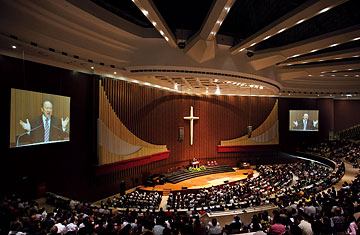
Jakarta's Reformed Millennium Center has seating for more than 4,500 worshippers
(2 of 3)
Over the past couple of years, Christian groups say, dozens of churches and theological academies have been destroyed or forced to shut by Islamic groups who accuse Christians of stealing believers from Muslim ranks. Despite appointing prominent Christians to his Cabinet, Indonesian President Susilo Bambang Yudhoyono has said little to defend religious minorities, and has remained silent as dozens of local governments pass Islamic-based laws that threaten Christian rights. Such moves "conflict with the constitution and have the potential to threaten freedom of religion in this country," according to Hendardi, chairman of the Setara Institute, a Jakarta-based NGO that promotes pluralism.
Last year, the Indonesia Ulema Council, an influential Islamic clerical body, sounded the alarm about Christian proselytization and called on Muslims to more staunchly guard their faith. The pace with which unlicensed churches are being shut down by local authorities is also increasing. Christians complain that gaining official sanction to build a mosque is easy while getting similar permission for churches is glacial. As a consequence, most Christian houses of worship are unofficial. "There is a real fear that Christianity is on the march," says Mike Hilliard, a Scottish minister who with his Indonesian wife runs an orphanage outside Jakarta that has been targeted by militant Muslims. "Because of this fear, emotions are easily stirred up and mobs can form quickly."
Defenders of faith have mobilized in neighboring Malaysia too. After a local court ruled on Dec. 31 that a Malaysian Christian newspaper could refer to the Christian deity as Allah, many Muslims, who constitute the multiethnic country's majority, protested. Christians professed puzzlement: when speaking Malay, they had used the word Allah for centuries — why the sudden outrage now? Prominent Islamic activists responded by saying that sharing one word for two different gods could lead some Muslims to unwittingly stray to Christianity. By January, passions had spilled onto holy turf, with around a dozen churches, one mosque and a Sikh temple attacked. Late that month, eight people were arrested for suspected roles in the firebombing of a Pentecostal church in the capital of Kuala Lumpur.
As both Muslims and Christians more fervently express their faith, a kind of spiritual siloing is developing in Southeast Asia, in contrast to the sectarian mixing that often characterized relations in previous generations. "Even compared to five years ago, relations between Christians and Muslims have worsened," says Father Andang Binawan, a Roman Catholic priest in Jakarta who holds a Ph.D. in theology from a Belgian university. "Many people now, including government officials, feel pressure by society to identify themselves as good Muslims and they worry that by associating with people of other religions, they will be seen as less pious. Even saying 'Merry Christmas' to a Christian can be seen as a problem."
At the same time, aggressive proselytization by Evangelical groups, both foreign and local, leads to accusations that Christians are hungry for souls — and church donations. Website and sermon invectives, in which some Christian preachers dismiss Muslims as terrorists, also feed a prejudicial cycle that is spinning both sides away from Indonesia's pluralistic underpinnings. (Unlike neighboring Malaysia, which was set up as a Muslim state — although one that guarantees minority religious rights — Indonesia recognizes six official faiths: Islam, Catholicism, Protestant Christianity, Buddhism, Hinduism and Confucianism.) "We have many [religions], and they all coexist peacefully," President Yudhoyono told TIME last November. "This is the capital we will use to show that a clash of civilizations can be prevented." But even as he spoke, Christian theological students were staging a sit-in on a busy Jakarta street to protest having been intimidated into evacuating their campus after threats from Muslim mobs. A clash of civilizations seemed to be exactly what was taking place.
Raising Spirits
To get to the hip-hop concert, you have to walk through a five-star hotel's lobby, go past a parking lot and take a cramped elevator ride to the 12th floor. There, in an anonymous Jakarta annex syncopated by a purple strobe light, Indonesian youths dance for Jesus. The congregation bops to the beat, waving their arms in the air as the lyrics implore them to let their "lives be a celebration" of Jesus' love. After pastor Jose Carol takes to the stage, some worshippers whip out their iPhones, onto which they have loaded electronic copies of the Bible. Back when the Jakarta Praise Community Church formed a decade ago, only a couple hundred people attended its services; today the congregation has grown to 5,500 mostly young urbanites.
